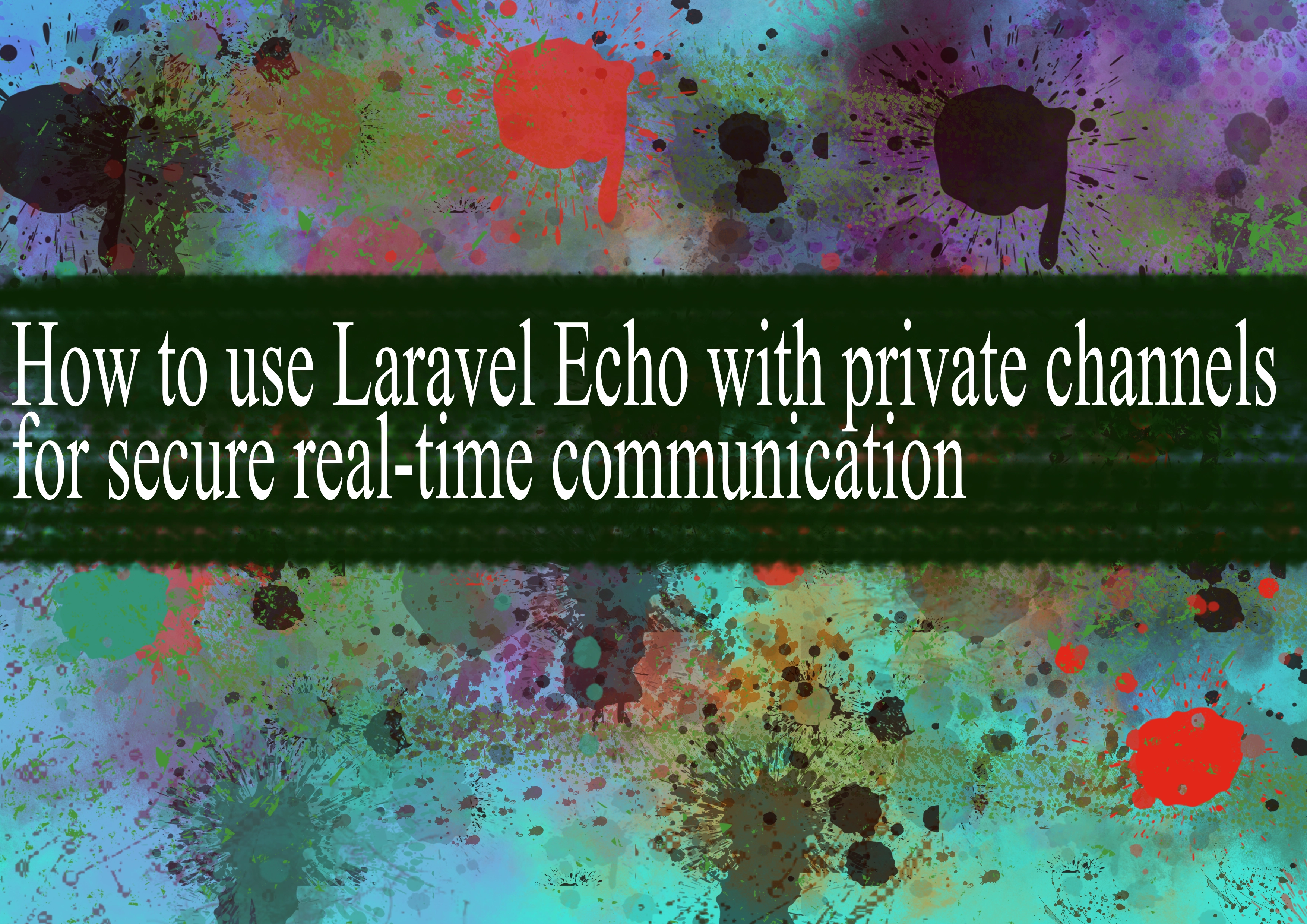How to use Laravel Echo with private channels for secure real-time communication

Laravel Echo is a powerful tool for real-time event broadcasting in Laravel applications. When it comes to private channels, you might want to restrict access to certain channels to authenticated users only. Here's a step-by-step guide on how to use Laravel Echo with private channels:
Install Laravel Echo and Pusher:
First, make sure you have Laravel Echo and a broadcasting service installed. Laravel Echo typically works well with Pusher, a real-time WebSocket service. Install the required packages:
bashcomposer require pusher/pusher-php-serverAnd update your
.envfile with your Pusher credentials:dotenvBROADCAST_DRIVER=pusher PUSHER_APP_ID=your-app-id PUSHER_APP_KEY=your-app-key PUSHER_APP_SECRET=your-app-secret PUSHER_APP_CLUSTER=your-app-clusterConfigure Broadcasting:
In
config/broadcasting.php, make sure the broadcast connection is set to Pusher:php'default' => env('BROADCAST_DRIVER', 'pusher'),Create Private Channels:
Create a private channel by updating
routes/channels.php. For example, let's create a private channel named "chat":phpBroadcast::channel('chat.{roomId}', function ($user, $roomId) { // You can implement custom logic here to determine if the user is authorized return Auth::check(); });In this example, the channel is private, and the user must be authenticated to access it.
Authenticate Users:
When a user subscribes to a private channel, Laravel Echo sends a request to your server to authenticate the user. You need to create a controller to handle this authentication. Run the following command to generate a controller:
bashphp artisan make:controller PusherControllerIn the
PusherController, implement theauthenticatemethod:phppublic function authenticate(Request $request) { return Broadcast::auth($request); }Don't forget to update your routes in
routes/web.php:phpRoute::post('/broadcasting/auth', 'PusherController@authenticate');Subscribe to Private Channels on the Frontend:
In your frontend code (JavaScript), use Laravel Echo to subscribe to the private channel. For example, if you're using Vue.js with Laravel Echo and Pusher:
javascriptimport Echo from 'laravel-echo'; window.Echo = new Echo({ broadcaster: 'pusher', key: process.env.MIX_PUSHER_APP_KEY, cluster: process.env.MIX_PUSHER_APP_CLUSTER, encrypted: true, }); // Subscribe to a private channel window.Echo.private('chat.' + roomId) .listen('ChatMessageEvent', (event) => { console.log(event); });Replace
ChatMessageEventwith the actual event you are listening to on the server side.Trigger Events:
On the server side, when you want to broadcast an event to the private channel, use the
broadcasthelper:phpbroadcast(new ChatMessageEvent($message))->toOthers();Replace
ChatMessageEventwith the actual event class you want to broadcast.
That's it! You now have a private channel set up for secure real-time communication using Laravel Echo and Pusher. Make sure to customize the code according to your specific requirements. Additionally, check the Laravel Echo and Pusher documentation for more advanced features and options:
-
Popular Post
- How to optimize for Google's About This Result feature for local businesses
- How to implement multi-language support in an Express.js application
- How to handle and optimize for changes in mobile search behavior
- How to handle CORS in a Node.js application
- How to use Vue.js with a UI framework (e.g., Vuetify, Element UI)
- How to configure Laravel Telescope for monitoring and profiling API requests
- How to create a command-line tool using the Commander.js library in Node.js
- How to implement code splitting in a React.js application
- How to use the AWS SDK for Node.js to interact with various AWS services
- How to use the Node.js Stream API for efficient data processing
- How to implement a cookie parser middleware in Node.js
- How to implement WebSockets for real-time communication in React
-
Latest Post
- How to implement a dynamic form with dynamic field styling based on user input in Next.js
- How to create a custom hook for handling user interactions with the browser's device motion in Next.js
- How to create a custom hook for handling user interactions with the browser's battery status in Next.js
- How to implement a dynamic form with dynamic field visibility based on user input in Next.js
- How to implement a dynamic form with real-time collaboration features in Next.js
- How to create a custom hook for handling user interactions with the browser's media devices in Next.js
- How to use the useSWRInfinite hook for paginating data with a custom loading indicator in Next.js
- How to create a custom hook for handling user interactions with the browser's network status in Next.js
- How to create a custom hook for handling user interactions with the browser's location in Next.js
- How to implement a dynamic form with multi-language support in Next.js
- How to create a custom hook for handling user interactions with the browser's ambient light sensor in Next.js
- How to use the useHover hook for creating interactive image zoom effects in Next.js